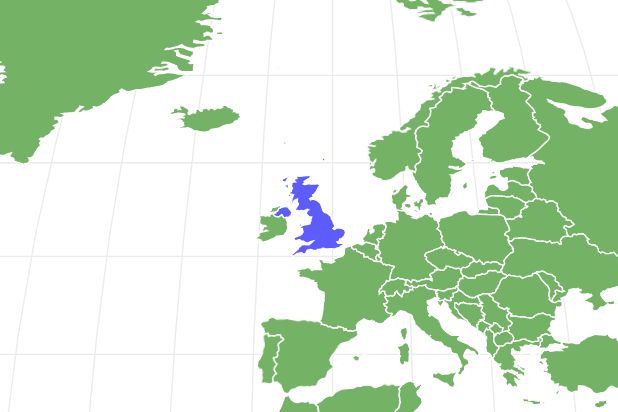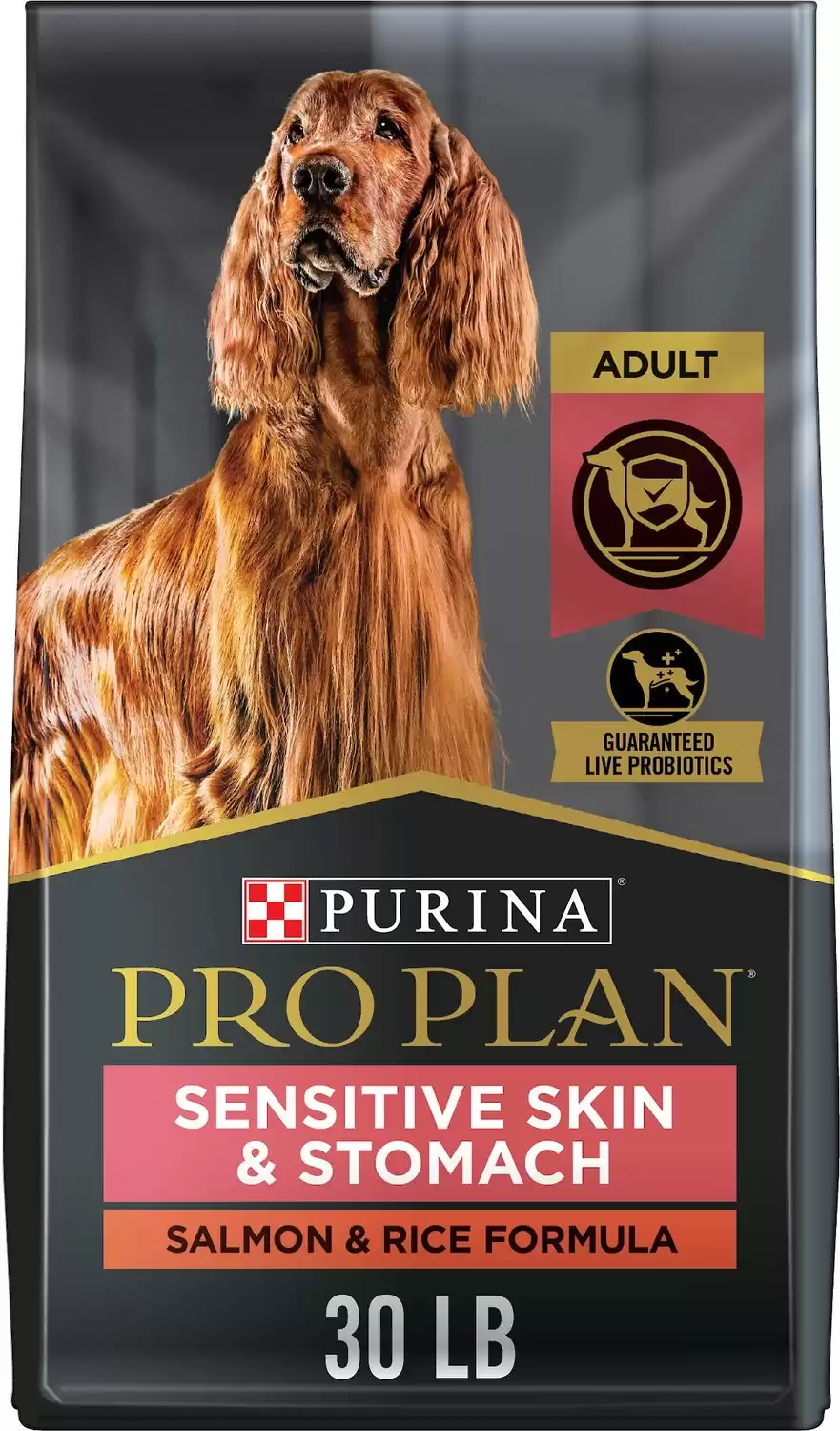Pointer
Canis Lupus
An independent, loyal and high energy breed!
Advertisement
Pointer Scientific Classification
- Kingdom
- Animalia
- Phylum
- Chordata
- Class
- Mammalia
- Order
- Carnivora
- Family
- Canidae
- Genus
- Canis
- Scientific Name
- Canis Lupus
Read our Complete Guide to Classification of Animals.
Pointer Conservation Status
Pointer Facts
Pointer as a Pet:
- General Health
- Energy Level
- Shedability
- Trainability
- Intelligence
- Tendency to Chew
- Size
- Family and kid friendliness
- Yappiness / Barking
- Moderate
- Separation Anxiety
- Moderate
- Preferred Temperature
- Average climate
- Exercise Needs
- High
- Friendly With Other Dogs
- Moderate
- Pure bred cost to own
- $1,800
- Dog group
- Sporting
- Male weight
- 55-75 lbs
- Female weight
- 45-65 lbs
This post may contain affiliate links to our partners like Chewy, Amazon, and others. Purchasing through these helps us further the A-Z Animals mission to educate about the world's species.
View all of the Pointer images!
Pointers are a very active, energetic, and friendly dog breed. They make a great family dog for families that are active and able to get the dog the exercise it needs each day.
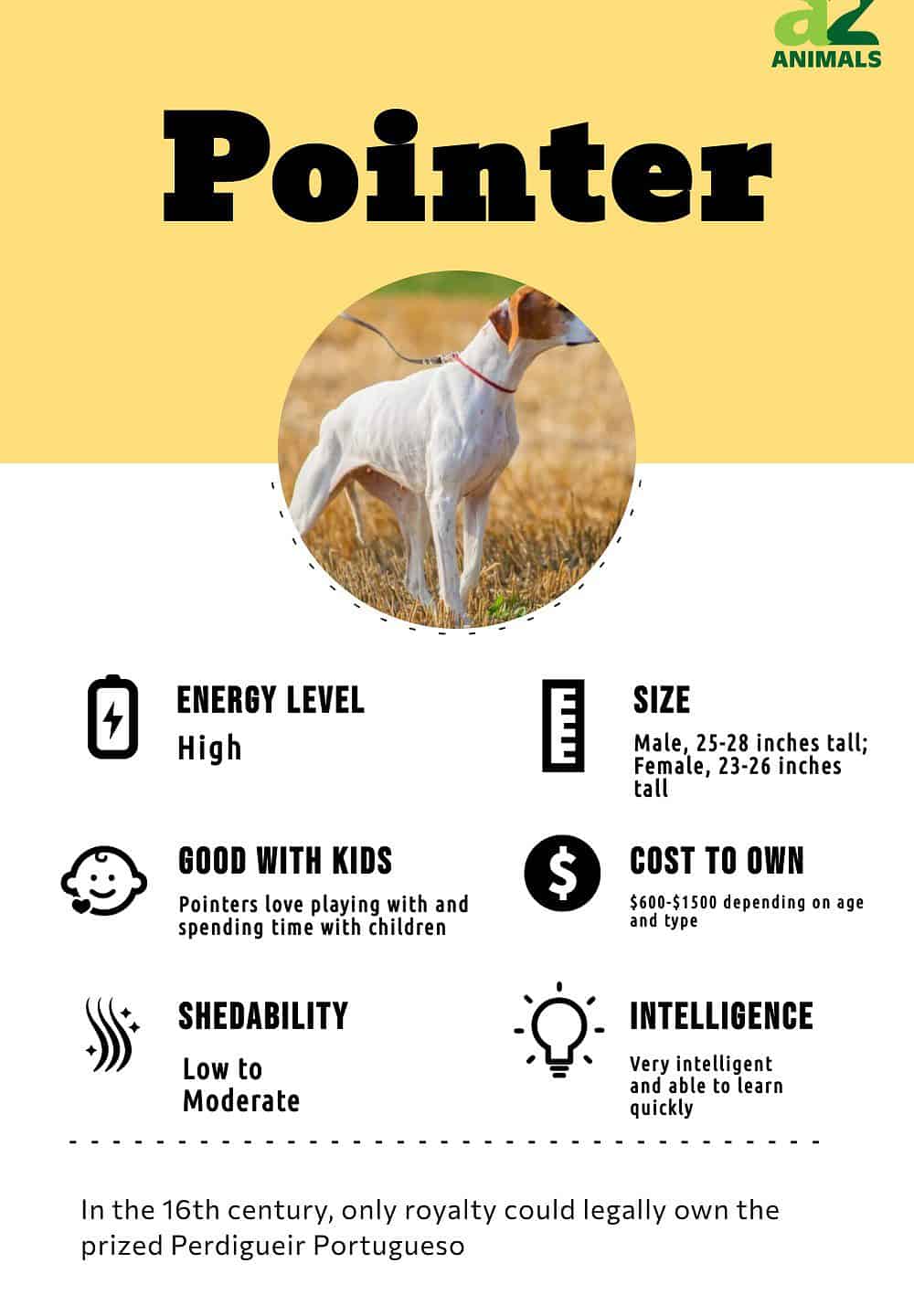
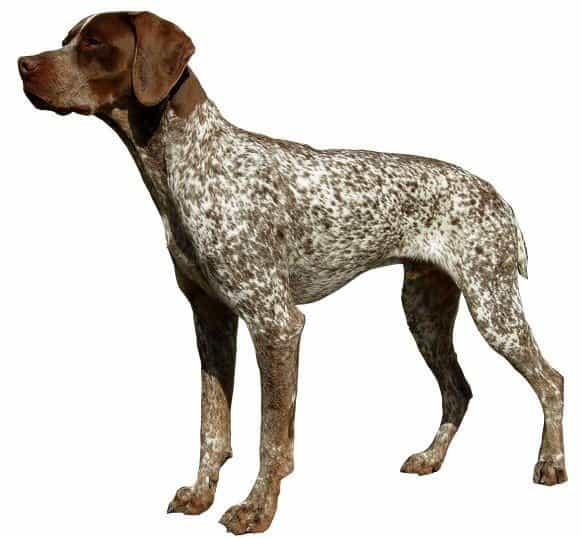
This large French Pointer, like all Pointers, is bred primarily as a hunting companion, single-minded when out in a field environment.
See all of our expert product reviews.
©Desaix83 / CC BY-SA 3.0, Wikimedia Commons – License
Pointers were originally bred to track and point out small prey, particularly birds. Pointing refers to the dog alerting its owner to the location of the prey. To do this, the dog stops, freezes, and aims its nose in the direction of a bird, for example, letting the owner know where to find it. Some types of Pointers also retrieve the bird.
History
This breed is usually attributed to Spanish origins, but some say it was developed by the Portuguese in the 1200s. The British might have had the dog already in medieval times, but a popular story is that British soldiers brought the dog to England from Spain in 1713. Others say a Portuguese merchant brought the breed to England, and there is a record of the breed in England in 1650. However it happened, the British developed the dog as it is known today with some crossbreeding with French and Spanish pointers to create an excellent companion for gamebird hunting.
3 Pros and Cons of Ownership
| Pros! | Cons! |
| Healthy Overall, pointers are a healthy breed and have fewer serious health concerns than other breeds. | Require a Lot of Exercise Pointers should get a few hours of exercise each day. If their exercise needs are not met, pointers may find less desirable ways to fill their need for activity. |
| Good Family Dog Pointers make a great family dog. They are friendly, playful, and love being around people and kids. | Needy Pointers are very friendly, but they can also be very needy. They may constantly try to be right with their owner, so it this is not something you’re looking for, a pointer may not be the right dog for you. |
| Easy to Groom Maintaining a pointer’s coat is relatively easy. They’ll only need weekly brushing to keep their fur looking nice. | Not Good with Other Non-Canine Pets Pointers can be trained to do well with other dogs, but they do not do well with cats, hamsters, or other pets. They tend to see these smaller animals as prey. |
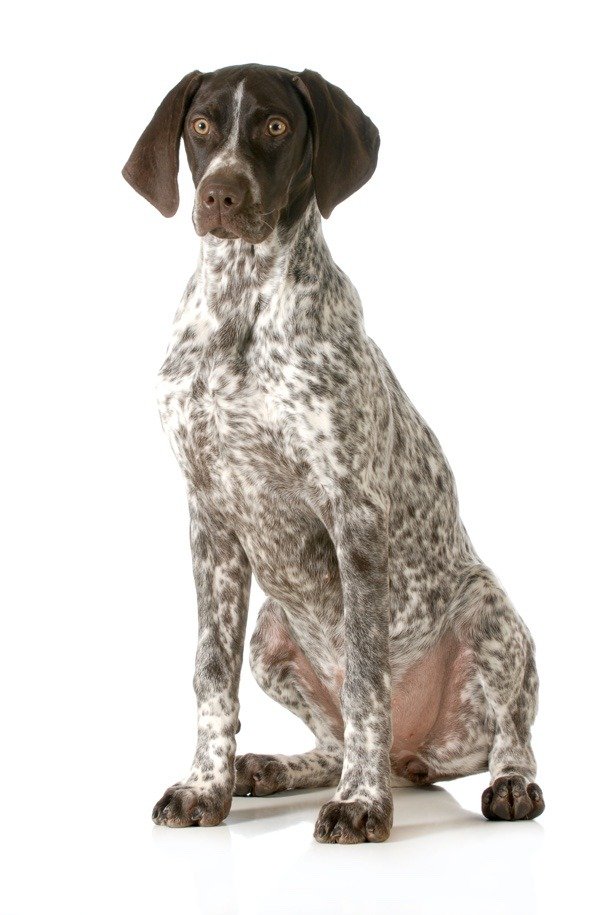
A mid- to large-sized dog breed, pointers are full grown by 16 months.
©WilleeCole Photography/Shutterstock.com
Health and Entertainment for your Pointer
See all of our expert product reviews.
Size and Weight
Pointers are a mid- to large-sized dog breed. Males are typically between 25 and 28 inches tall and weigh between 55 and 75 pounds. Females are a little smaller than their male counterparts and are generally between 23 and 26 inches tall. Females weight between 45 and 65 pounds. At the age of 3 months, a female pointer puppy will weigh somewhere between 14 and 25 pounds, while a male puppy will weigh between 16 and 28 pounds. Pointers are fully grown by the time they are 16 months old.
| Height | Weight | |
| Male | 25-28 inches | 55-75 lbs |
| Female | 23-26 inches | 45-65 lbs |
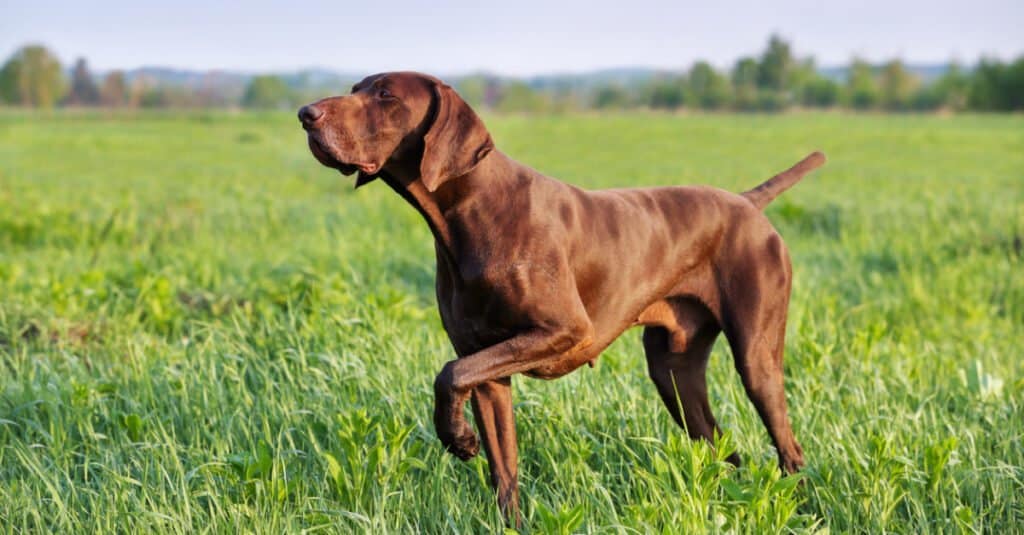
With its beautiful coat and regal pose, the brown German Shorthaired Pointer is eye-catching and one of a very healthy dog breed.
©Vitalii_Mamchuk/Shutterstock.com
Common Health Issues
Compared to other dog breeds, pointers are overall very healthy. However, there are still a few common health problems you’ll want to be on the lookout for if you adopt a pointer.
Since pointers generally have a longer life expectancy than many other breeds, it puts them at a higher risk of developing cancer when they get older. Taking your dog in for regular checkups at the veterinarian can allow it to be screened for any signs of cancer to catch it early. When caught early, there are more treatment options, and the prognosis for your dog will be much better.
Pointers also have a higher rate of hemangiosarcoma, a bleeding tumor that often forms in the spleen, but may develop in other organs in the body as well. When not caught, this tumor can break open, causing internal bleeding in the dog.
Bloat is another health concern to be on the lookout for. Dogs with narrow and deep chests, like the pointer’s, are more at risk for bloat. If a pointer bloats, their stomach gets twisted and fills with gas. This can be deadly very quickly, so keeping an eye out for any of the signs and seeking emergency treatment immediately will be critical. You may also be able to talk to your veterinarian about scheduling preventative surgery for your dog.
Some pointers may also suffer from hip or elbow dysplasia. This is an inherited disease that causes arthritis due to a pointer’s joints developing improperly. If you notice that your dog is limping or having trouble getting up from their bed, it could be a sign that they are experiencing pain. If you notice any of these symptoms, you’ll want to be sure to schedule an appointment with the vet.
Pointers have also been known to suffer from allergies, particularly skin allergies (atopy). Allergens, such as pollen, dust, or mold, can cause their skin to itch. Most of the time, the folds of their skin, their ears, their feet, and their stomachs are the areas that are impacted. A pointer who frequently rubs their face or licks their paws may have allergies. Another sign of allergies in pointers is regular ear infections.
In summary, here are some of the main health issues Pointers face:
- Cancer
- Hemangiosarcoma
- Bloat
- Hip and elbow dysplasia
- Atopy (skin allergies)
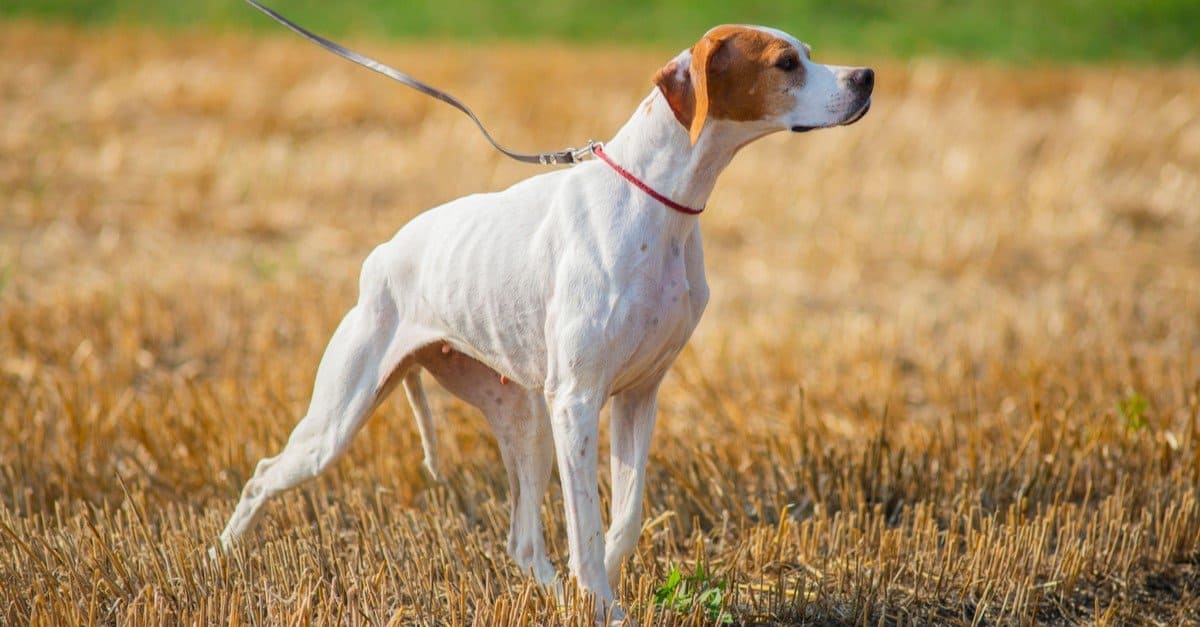
Red and white English Pointer in the field. They are great for tracking small prey but a good dog for families as well.
©Anna Pozzi – Zoophotos/Shutterstock.com
Temperament
Pointers have a very even-tempered personality, which, along with their behavior, makes them a great family pet for many families. However, pointers are also very energetic and active. Because of these traits, it is essential to make sure that a pointer gets regular exercise and activity each day. Otherwise, they may find less desirable ways to get their energy out inside the house.
Another personality trait of a pointer is that they love interacting with their family. They will look for frequent attention and want to spend their time close to their human family members. They also love playing with and spending time with children, though because they can be very hyper, it will be best to closely supervise them around children, especially younger children.
Care
If you are considering adopting a pointer dog or puppy, there are a few key things you’ll want to keep in mind as you plan for their care. A pointer’s personality, exercise and nutrition needs, and common health concerns, such as bloat, should all be considered before you add this dog breed into your family.
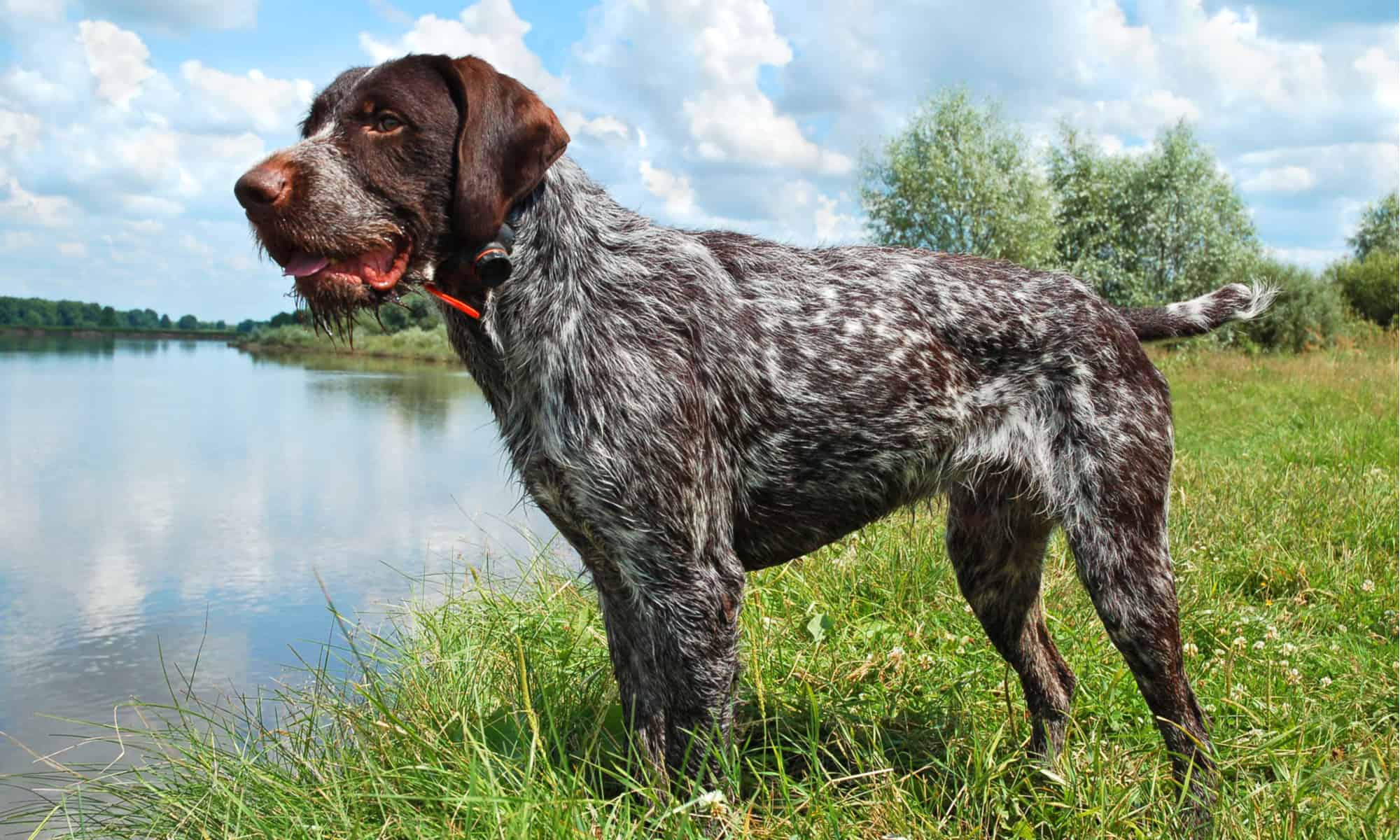
German wirehaired pointers require a lot of exercise and stimulation. Pointers enjoy being outdoors and like foods from their natural environment..
©eAlisa/Shutterstock.com
Best Dog Food
When selecting food for your pointer, it will be important to choose something that offers a good balance of carbohydrates, fatty acids, proteins, vitamins, and minerals. Ideally, you’ll select foods that offer a similar makeup to what pointers used to eat from their natural environment.
Foods that are good for pointers and pointer puppies include poultry, fish, brown rice, and avocado. These are foods that the ancestors of the pointer would have eaten in Spain. You will want to avoid foods such as soy, beef, beet pulp, or horse meat when planning your pointer’s diet.
Always select high-quality food options from reliable companies. Look for products that are made without artificial preservatives. You can also consider cooking your own food for your pointer. Either way, consulting with your veterinarian to make sure the nutritional needs of your dog are being met is advisable.
At A-Z Animals, we think the best dog food for Pointers is Purina Pro Plan Sensitive Skin & Stomach, High Protein Dry Dog Food.
This high-protein salmon recipe soothes both skin and stomach. The real fish ingredients are a natural source of glucosamine for joints and omegas to nourish your Pointer’s sensitive skin and coat. Additionally, the wholesome grains are easy to digest and prebiotic fiber balances the gut bacteria to optimize digestion.
See if your dog enjoys Purina Pro Plan Skin and Stomach High Protein Dog Food, available on Chewy and Amazon.
- Salmon and rice recipe for sensitive stomachs and and skin
- Live probiotics for optimum digestive health
- Sunflower oil promotes healthy skin and coat
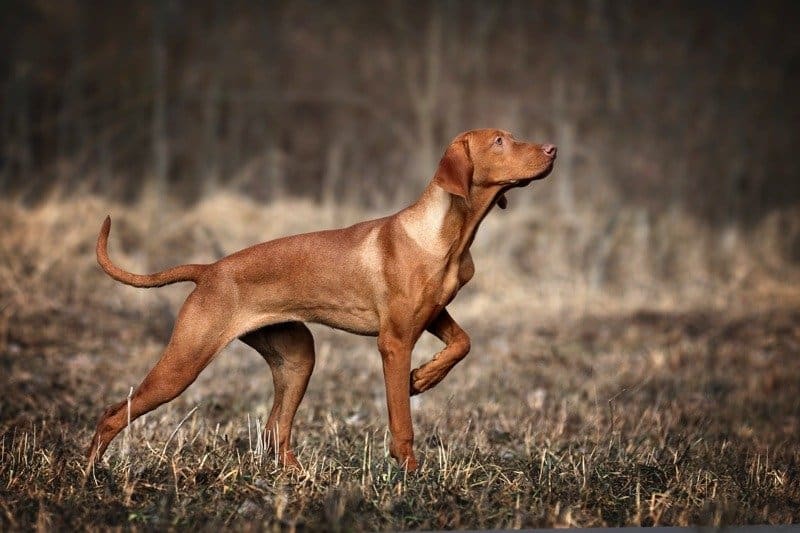
Pointers are a low-maintenance dog and easy to train.
©Ivanova N/Shutterstock.com
Maintenance and Grooming
Pointers are a relatively low-maintenance dog. You’ll want to brush their coat about once a week using a hound glove or a soft-bristled brush. This will keep their hair loose and remove any dirt that may have become trapped between the hair.
Another important task will be keeping your pointer’s ears clean. You can purchase an ear cleaning solution and use it along with some soft gauze to remove any dirt or debris from their ears. Additionally, be sure to regularly trim your dog’s nails so they don’t get so long that it becomes uncomfortable for them to walk. Be sure to brush your pointer’s teeth regularly to prevent any dental problems.
Training
Pointers are relatively easy to train. While you may notice that your pointer is stubborn, most will respond well to positive reinforcement, such as praise or treats. Be prepared to spend some time training your pointer. But once they have mastered some basic commands, you’ll find it is relatively easy to complete further training; they are very intelligent and are able to learn quite quickly. It is best to begin training a pointer when they are very young puppies.
Many pointers are even used as service animals or therapy dogs due to their pleasant personality and ability to be well-trained.
Exercise
Pointers are a very active breed. Providing sufficient exercise each day will be essential for their health and well-being. Each day, you’ll need to make sure that your dog gets a few hours of exercise. Exercising a pointer may include taking a walk, playing fetch or another game together, or letting them run around in a fenced backyard. Because of the amount of activity they need, pointers do better in a single-family home with a yard than a small apartment.
Puppies
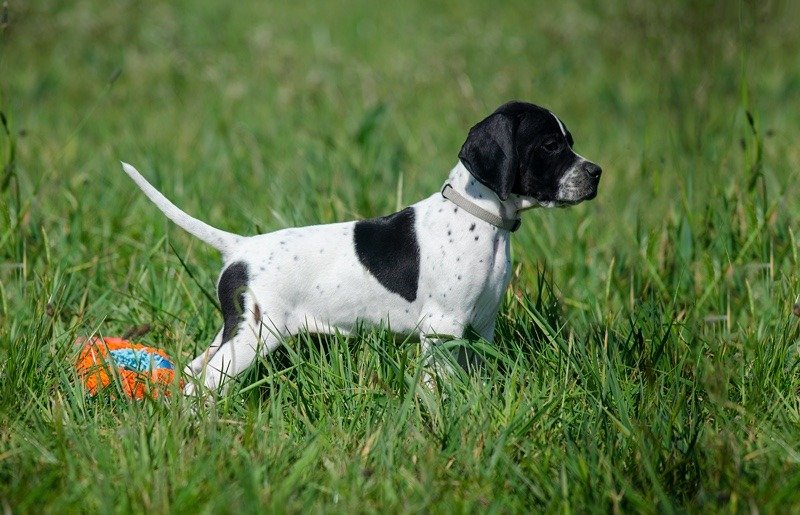
©Viktoria Hadlaczki/Shutterstock.com
When you adopt a new puppy, it will be important to begin training them right away. Even as young puppies, pointers are very intelligent and able to begin learning commands and expectations. Be sure to closely supervise your new puppy and puppy-proof your home to prevent any accidental injuries or damage to your important belongings.
Make sure your new puppy gets plenty of exercise and playtime. These dogs are very energetic, so they need lots of activity.
Children
The pointer is a good dog to have around children, but not ideal for homes that have infants or toddlers. Pointers enjoy playing with kids, but could accidentally injure a baby or toddler by jumping onto them or knocking them with their wagging tail. It is important to note that you’ll always want to supervise children around a pointer, as you would with any other dog breed. Teach children how to appropriately play and interact with your dog to prevent accidental injuries to the dog or your child.
Types
The main differences among these pointers is their coloration, hair type, and country of origin. However, they have common ancestors and were all bred to be good hunting dogs skilled at pointing.
- English Pointer: Perhaps the most famous of the pointers because of its pointing stance, the English variety has a white coat with reddish brown, black, or orange patches. The hair is short and fine.
- German Shorthaired Pointer: This dog is white with a reddish brown roan appearance, but they can be solid colored or with patches.
- German Longhaired Pointer: Excellent at tracking, pointing, and retrieving, the German Longhair can also jump high. Coloring is brown, speckled, or brown with white markings, and the ears are furry.
- German Wirehaired Pointer: Versatile, sturdy and eager to work, no matter the climate, this breed is a blend of many different hunting and tracking dog types, including wirehaired pointing griffons
- Weimaraner: Because of its distinctive slivery-gray coat, this dog is called the “Gray Ghost.” The coat is solid gray with an occasional small white spot on the chest. The eyes are amber or blue-gray.
- Large French Pointer: Also known as the Braque Francais, which may be the parent breed to all pointers, particularly the short-haired ones. The Braque Francais is the smaller and more popular of two types; the other is the larger Gascony. The breed came from the Pyrenees Mountains hundreds of years ago.
- Wirehaired Pointing Griffon: Considered a superior gundog, the “Griffs” have a harsh and bristly coat. Their coloring is gray with brown markings, and they have a big mustache and eyebrows .
- Cesky Fousek: A rare breed that is possibly centuries old, this dog hunts, points, and retrieves. Its name means Czech whiskers, which are part of its rough coat. The brown or amber eyes have a distinctive almond shape.
- Auvergne Pointer: From Auvergne, France, this breed is a close relative of the Braque Francais. Noted as good retrievers, this breed has a black and white spotted coat, short and smooth, and usually a solid black head.
- Old Danish Pointer: Developed in the early 1700s, possibly by Martin Bak (the locals call it the Bakhound). This breed has short heads, lean bodies, and brown eyes.
- Perdigueiro Portugueso: This Portugues Pointer is square in build with a short and coarse coat but velvety fur on its triangular ears and beagle-like face.
- Large Munsterlander: Not related to the Small Munsterlander, the Large Munsterlander was bred from the German Longhaired Pointer. It has long, black and white fur, great endurance in all kinds of weather, and is especially loyal and obedient.
Similar Dogs
Stabyhorns, Spinone Italianos, and Irish setters are three other dog breeds that are similar to pointers in that all have hunting and pointing in their heritage.
- Stabyhoun: A rare breed, this medium-sized dog with silky hair is best suited as a farm dog and hunter/tracker. The stabyhorn, although friendly and affectionate, makes a good guard dog. The breed is very active, but obedient and docile.
- Spinone Italiano: From an old Italian dog breed going back to at least to the 15th century, this dog was once a pointer and still is good for waterfowl hunting. Mostly, it is a friendly, patient dog well-suited to being with a family. A large dog that likes to be outside, it has medium hair in orange, white or brown.
- Irish Setter: A medium-sized dog with medium-length hair, this dog is playful and very energetic. A Setter has a good nose for searching, so it is a good hunting dog, but it is too friendly to be a guard dog. The hair can be a reddish maroon or red and white. The setter’s eyes are very expressive, and the dog makes a good companion or family dog.
- Small Munsterlander: A popular hunter and retriever in Europe, this dog loves the water. It has a strong pack instinct, so it likes to be near its master.
Popular Names for Pointers
If you’re looking for the perfect name for your German longhaired pointer, German wirehaired pointer, German shorthaired pointer, or English pointer, here are a few popular names to consider:
- Murphy
- Chaos
- Rocky
- Bruno
- Smoky
- Sophie
- Honey
- Sugar
- Flora
- Penny
Famous Pointers
There are a few famous people you may recall who own (or owned) pointers:
- Bradley Cooper has a German shorthaired pointer named Samson.
- Clark Gable had a German shorthaired pointer.
- Judy was a famous pointer dog that helped the crew of the HMS Gnat and HMS Grasshopper (ships during WWII) by notifying them when she detected incoming aircraft.
Pointer FAQs (Frequently Asked Questions)
How much does a pointer cost to own?
The cost of adopting a pointer puppy can vary based on their pedigree and breed lines. While the average cost is around $700, you could easily pay over $1,800 for some dogs. Some other factors that could impact what you pay include the breeder you choose and their reputation, the size of the litter, and if the puppy has been trained yet.
In addition to the cost to adopt a pointer, you’ll also want to budget for other costs of pet ownership. These include supplies such as leashes, crates, dog beds, bowls, and toys. You’ll also need to pay for food, regular veterinarian visits, and preventative medications. Your first year owning a pointer, you should expect to spend between $500 and $2,000. After the first year of ownership, you should still budget between $500 and $1,000 for expenses and care.
Is a pointer good with kids?
Yes, pointers can be very good with kids. They have a lot of energy and enjoy playing with children. Due to their hyperactive nature, pointers may not be the best dog if you have babies or toddlers, but they should be good with older kids.
How long does a pointer live?
Pointers normally live between 12 and 17 years.
How big is a pointer?
When they are fully grown, male Pointers weight between 55 and 75 pounds and are between 25 and 28 inches tall. Fully grown females generally weigh between 45 and 65 pounds and are 23 to 26 inches tall.
Are pointers good family dogs?
Yes, pointers can make an excellent family dog. However, due to their very active and hyper personality, they are best for families who lead a very active lifestyle. Pointers need to get a few hours of exercise each day, so they would be an excellent fit for families who enjoy hiking, walking, running, or spending time at the park. Pointers also enjoy relaxing with their family on the couch.
Do pointers dogs bark a lot?
No, in general pointer dogs do not bark a lot if they get enough exercise and have been trained. If a pointer gets bored, they may begin to bark, though. Pointers will also bark if they sense danger so they can let their owner know.
Are English Pointers good pets?
Yes, English pointers make good pets, as long as you’re able to make sure they get enough exercise each day. Pointers are very loving animals who are always excited to be near their owners. They are also very active and need a few hours of exercise each day, so they are not well-suited to life in an apartment. They would be better suited to living with a family that has a larger house with a yard and space for them to run around in.
How do you train a German shorthaired pointer?
One key thing to keep in mind when training a German Shorthaired pointer is to start training early. Once you bring your new puppy home, you should begin the training process right away. Even from a young age, German Shorthaired Pointers are able to learn quickly. Look for puppy obedience classes that you can begin while your dog is still young. Pointers can be pretty stubborn, so getting them into a class early will help with your training efforts. An obedience class will also help you learn how to effectively give commands and provide your dog with the structure he’ll need to become well-trained.
It will also be important to begin socializing your new puppy with other dogs and people. This will help make sure he is comfortable in a variety of settings and with different people and animals.
Are Pointers herbivores, carnivores, or omnivores?
Pointers are Omnivores, meaning they eat both plants and other animals.
What Kingdom do Pointers belong to?
Pointers belong to the Kingdom Animalia.
What class do Pointers belong to?
Pointers belong to the class Mammalia.
What phylum to Pointers belong to?
Pointers belong to the phylum Chordata.
What family do Pointers belong to?
Pointers belong to the family Canidae.
What order do Pointers belong to?
Pointers belong to the order Carnivora.
What type of covering do Pointers have?
Pointers are covered in Hair.
What genus do Pointers belong to?
Pointers belong to the genus Canis.
What is an interesting fact about Pointers?
The Pointer is an independent, loyal, and high energy breed!
What is the scientific name for the Pointer?
The scientific name for the Pointer is Canis Lupus.
Thank you for reading! Have some feedback for us? Contact the AZ Animals editorial team.
Sources
- American Kennel Club (1970) www.akc.org/dog-breeds/pointer/
- Dog Time, Available here: https://dogtime.com/dog-breeds/pointer#/slide/1
- Wikipedia (1970) en.wikipedia.org/wiki/Pointer_(dog_breed)
- Harlingen Veterinary Clinic, Available here: https://www.harlingenveterinaryclinic.com/services/dogs/breeds/pointer#:~:text=Pointers%20are%20prone%20to%20a,aggression%2C%20and%20other%20behavioral%20changes
- EmboraPets.com, Available here: https://emborapets.com/pointer-temperament-whats-it-like-owning-one/
- Dogell.com, Available here: https://dogell.com/en/compare-dog-breeds/pointer-vs-irish-water-spaniel#google_vignette
- Healthy Homemade Dog Treats, Available here: https://healthyhomemadedogtreats.com/top-pros-and-cons-of-owning-german-shorthaired-pointer/
- Prestige Animal Hospital, Available here: https://www.prestigeanimalhospital.com/services/dogs/breeds/pointer#:~:text=Brush%20her%20coat%20as%20needed,leashed%20walks%20are%20a%20must

